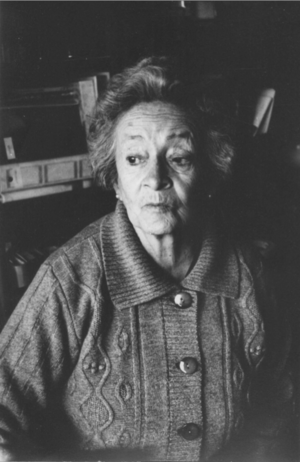Alicia Yánez Cossío facts for kids
Quick facts for kids
Alicia Yáñez Cossío
|
|
|---|---|
 |
|
| Born | December 10, 1928 (age 97) Quito, Ecuador |
| Occupation | Writer, poet, journalist |
| Language | Spanish |
| Notable awards | Premio Eugenio Espejo (2008), Sor Juana Inés de la Cruz Prize (1996) |
Alicia Yáñez Cossío was born in Quito, Ecuador, on December 10, 1928. She is a very important writer from Ecuador, known for her poems, novels, and journalism. She is one of the most famous writers in Ecuador and Latin America. Alicia Yáñez Cossío was the first Ecuadorian to win the Sor Juana Inés de la Cruz Prize, which she received in 1996. In 2008, she also received Ecuador's highest award for writers, the "Premio Eugenio Espejo", for all her amazing work over the years.
Contents
About Alicia Yáñez Cossío
Early Life and Dreams
Alicia Yáñez Cossío is the daughter of Alfonso Yáñez Proaño and Clemencia Cossío Larrea. When she was six years old, she started school at Sagrados Corazones in Quito. She didn't really like math, which sometimes made school a bit tricky for her.
However, from a very young age, Alicia knew she wanted to be a writer. She had a special talent for words and loved to create stories. She once said that her childhood was "extremely happy" and a bit like a boy's. She enjoyed reading adventure books by Julio Verne and stories about Tarzan, and she never really liked playing with dolls.
Her Writing Style
Alicia Yáñez Cossío's stories often feature characters who fight for basic rights for women. She frequently writes about machismo, which is when men believe they are superior to women. She uses humor, sarcasm, and exaggeration to show how silly these ideas of male superiority can be.
She also writes about social ideas like virginity and homosexuality, making people think about them in new ways. One of her well-known novels is "El Cristo Feo" (which means "The Ugly Christ").
Life and Achievements
In 1993, Alicia Yáñez Cossío became a widow. Her fame as a writer has spread far beyond Ecuador. In 1996, she won the Sor Juana Inés de la Cruz Prize. This award is given to the best novel written by a woman in Latin America.
In 1998, she published "Retratos cubanos" (meaning "Cuban Portraits"). This book contains 18 short stories she wrote between 1957 and 1961 while in Cuba. These stories are mostly about people fighting for freedom. The original stories were taken away when their authors left Cuba. Alicia rewrote them in 1996, mixing history with a realistic style.
Alicia Yáñez Cossío is also the mother of another writer, Luis Miguel Campos Yáñez.
Her Books
Novels
- Bruna, soroche y los tíos (1973)
- Yo vendo unos ojos negros (1979)
- Más allá de las islas (1980)
- La Cofradía del Mullo de la virgen Pipona (1985)
- La casa del sano placer (1989)
- El cristo feo (1995)
- Aprendiendo a morir (1997)
- Y amarle pude... (2000)
- Sé que vienen a matarme (2001)
- Concierto de sombras (2004)
- Esclavos de Chatham (2006)
- Memorias de la Pivihuarmi Cuxirimay Ocllo (2008)
Poetry
- Luciolas (1949)
- De la sangre y el tiempo (1964)
- Plebeya mínima (1974)
Short Stories
- El beso y otras fricciones (1975)
- Relatos cubanos (1998)
Plays
- Hacia el Quito de ayer (1951)
Books for Kids
- El viaje de la abuela (1997)
- Pocapena (1997)
- Los triquitraques (2002)
- ¡No más! (2004)
- La canoa de la abuela (2006)
Awards and Recognition
Alicia Yáñez Cossío has received several important awards for her writing:
- National Novel Contest – Fiftieth Anniversary of the journal "El Universo" of Guayaquil (1971)
- Sor Juana Inés de la Cruz Prize (1996)
- Eugenio Espejo Prize in Literature (2008)
The Alicia Yáñez Cossío Children's Literature Contest
In 2002, the government of Pichincha Province honored Alicia Yáñez Cossío by starting a children's literature contest named after her. This contest encourages people from all over Pichincha to write and share stories. It helps create new ways for people to express themselves, research, and strengthen their cultural identity.
See also
 In Spanish: Alicia Yánez Cossío para niños
In Spanish: Alicia Yánez Cossío para niños

